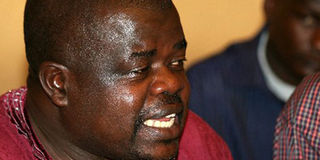Group wants church and MPs' pact over draft

Activist Omkiya Omtatah. He says Kenyan MPs and the Church should formulate a formal agreement to help pass the proposed constitution. Photo/FILE
Kenyan MPs and the Church have been asked to have a formal agreement to help pass the proposed constitution and then amend the contentious clauses immediately after the referendum.
The civil society group, Kenyans for Justice and Development (KEJUDE), said the formulation of a Memorandum of Understanding between the churches and MPs would persuade Kenyans to vote to pass the draft.
Activist Okiya Omtatah also defended the position taken by the churches but said they should emulate the Christian God and “not destroy the righteous along with the wicked” by rejecting the draft.
“Instead of rejecting the proposed constitution, church leaders should demand that President Kibaki and Prime Minister Raila Odinga lead MPs into signing a pre-referendum memorandum of understanding that immediately the new Constitution is ratified they will embark on amendments to remove all offending clauses,” said Mr Omtatah at a press conference in Nairobi.
He said the MoU would be “a sure way of giving Kenyans a new Constitution but not the simple way of dismissing the Church concerns as dismal and parochial.”
The tide has turned on a section of church leaders who have vowed to rally their flock against the draft laws because of their opposition to clauses on abortion and kadhi’s courts for the Muslim community.
On Sunday, Reverend Timothy Njoya led a consortium of NGOs in condemning the stand taken by the National Council of Churches of Kenya and the Catholic Church.
“If the Church campaigns for a “No” vote and fails to garner support among Kenyans, that will be the end of its responsibility for the Kenyan society. It will have caused its own abortion,” Rev Njoya said.
The NCCK and the Catholic Church could set themselves on a collision course with MPs, a majority of whom appear ready to marshal their constituents to support the draft law.
The President and the PM have already declared their support for the draft, but a section of ODM MPs from the Rift Valley have expressed their discomfort with sections of the draft they wanted amended.
On Monday, KEJUDE suggested a formal agreement would cool the heat between those against the draft and its proponents.
But it could also turn out to be complicated as the Constitution can only be amended through a Bill brought before Parliament or a popular initiative signed by at least one million registered voters.
Bishop Anthony Muheria of the Catholic Diocese of Kitui said the idea would be welcome but likely to be coloured by fears that MPs would go back on the agreement once the draft is passed.
“It may be a good suggestion but we know the history of MoUs in Kenya. Again, history will judge us harshly that at one point in time, we set aside our principles for something that could have been solved beforehand,” said Bishop Muheria.
He said the Catholic Church had always supported the drive to get a new set of laws for Kenya but has been forced to take the “painful” decision to reject it because of a few disagreements.
On Sunday, John Cardinal Njue said MPs had let Kenya down by frustrating attempts to amend the draft on Wednesday and Thursday last week but was optimistic that something could be done before the referendum.
Head of the Anglican Church in Kenya Archbishop Eliud Wabukala appeared to go back on his earlier stand in support of the draft and said the Church’s bishops would take a common stand after taking debate on the draft to the grassroots.
Although the Constitution was passed by Parliament, the Catholic Church and some evangelical groups have vowed to fight it because of its provisions on abortion and Kadhis' Courts.
The Church objects to the section of Article 26 which empowers doctors to end a pregnancy only if it endangers the woman's life or she needs emergency treatment. The section reads:
"Abortion is not permitted unless, in the opinion of a trained health professional, there is need for emergency treatment, or the life or health of the mother is in danger , or if permitted by any other law."
Christian leaders are also opposed to the retention of kadhis' courts in the proposed Constitution under Article 169 and 170, which limit their authority to disputes over personal status, marriage, divorce or inheritance, where all the parties are Muslims and agree to take the case to a Kadhi.
On Monday, KEJUDE argued that the church was justified in taking its stand as its leaders “represent an important constituency and the issues they are raising are fundamental.”
Kadhi courts would remain if the draft were rejected at the referendum but Mr Omtatah argued that passing the document containing them would amount to “legitimising the historical mistake made when writing the current Constitution.”
“If they go into the new Constitution, their status changes because they will be there by the mandate of Kenyans. Hence, their substance will change from illegitimate to legitimate even though their form as courts subordinate to the High Court will remain,” said Mr Omtatah.
Muslim leaders and MPs are expected to converge in Nairobi this week to discuss the draft constitution and take a common stand on whether to reject or accept it.




